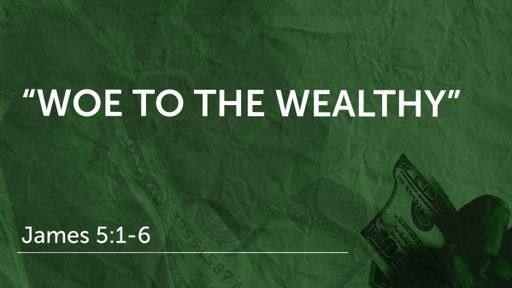"Woe to the Wealthy"

Notes
Transcript
Summary:
Is it good to be rich?
Is it good to be rich?
What’s good about it?
What’s bad about it?
James is addressing an extreme here.
But extremes start with non-extremes.
Who is James writing about here?
Who is James writing about here?
James has addressed wealth before, primarily to believers (James 1:9–11; James 2:1–7; James 4:13-17).
Here James seems to be describing non-believers (commentators agree).
He is speaking like an OT prophet pronouncing doom on an ungodly nation.
He does not call the people that he is attacking here to any repentance or action.
Why would James write to believers about wealthy non-believers?
We’ll say more later, but...
It places emphasis upon the evil and result of their sin.
Think of this as a strong condemnation of this sin.
Some of these wealthy non-believers may be present in the church...
But, James wants believers to understand this condemnation as well.
Warning (v. 1)
Warning (v. 1)
What miseries?
Probably not in this life, but the next.
The reference to fire in verse 3 is probably hell-fire - eternal judgment (Mark 9:43).
And if your hand causes you to sin, cut it off. It is better for you to enter life crippled than with two hands to go to hell, to the unquenchable fire.
James is not clarifying specifics of the misery, he is basically saying they will have regret (Luke 16:19–31).
However, there is in this still and indication that there is still time to repent.
Weep and howl - cry out.
In repentance
Why?
Not because of riches alone.
But because of the following...
Reasons (vv. 2-6)
Reasons (vv. 2-6)
4 reasons taken together make up the complete picture here:
Laid up treasure (vv. 2-3)
Laid up treasure (vv. 2-3)
What kind of treasure?
Earthly treasure
Last day are day before the end - then and now (Hebrews 1:2).
What’s wrong with this treasure?
They don’t last.
It seems here that they weren’t even needed.
They can be evidence/a witness against you in the end (Matthew 6:19–21).
19 “Do not lay up for yourselves treasures on earth, where moth and rust destroy and where thieves break in and steal,
20 but lay up for yourselves treasures in heaven, where neither moth nor rust destroys and where thieves do not break in and steal.
21 For where your treasure is, there your heart will be also.
Kept back wages (v. 4)
Kept back wages (v. 4)
From whom?
Those hired to take care of their land - earthly treasure.
Why would they do this?
They have been corrupted by their riches - this is an extreme of that pursuit.
Their riches are more important than people.
Their actions are against people.
Therefore, their actions are against God and His army - they’re on the wrong side.
Lived in luxury (v. 5)
Lived in luxury (v. 5)
Basically, they pursued and attained whatever they wanted.
They feed their hearts with their feasting.
Which, once again leads to hurting others...
Condemned the righteous (v. 6)
Condemned the righteous (v. 6)
Condemned
Treated as guilty
Though they are not - righteous.
In fact, they are not even against them.
The rich might use their wealth and power to wrongly accuse and condemn those who stand in the way of their ultimate pursuit of riches.
Murdered
To treat a poor person in this way was basically condemning them to death. How could they survive?
This is an extreme. This is how far it can go. This is how corrupt someone can be.
Notice how these four reason go back and forth between selfishness and hurting others.
Why did James write this to the church?
Why did James write this to the church?
These wealthy unbelievers might have been present in the church - repent.
But for the rest...
You don’t want to be like these people - wealth should not be so attractive to us.
If these people are mistreating you, keep this in mind (Psalm 37:1–16).
Psalm 37:1–16
Psalm 37:1–16
Benediction: Ephesians 6:23–24
Scripture Reading: Luke 16:19–31
